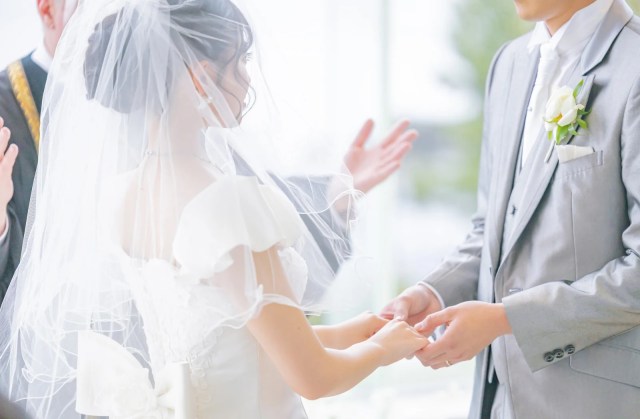
The Japanese constitution requires couples to share a family name if they get married, but only one age group in survey comes close to agreeing with it.
When a couple gets married in Japan, usually the wife takes her husband’s family name. However, it’s not shocking for the guy to give up his family name and take his bride’s instead. It’s not the norm, but it’s definitely something that’s more common in Japan than the U.S.
What you won’t see, however, is couples who tie the know and each retain their family name. As a matter of fact, that kind of arrangement is illegal under Japan’s current constitution, which stipulates that a married couple must have the same family name.
However, as time goes by social attitudes can shift and evolve, and in recent years an increasing number of people have been voicing their opinion that the requirement that married couples share a family name should be repealed. To gauge the public’s feelings on the matter, public broadcaster NHK conducted a randomly-dialed telephone survey last month, gathering responses from a total 1,534 people across Japan aged 18 and up.
▼ “Hello! Do you, or your identical-family-name-spouse, have time to answer a few questions?”
When asked how they felt about the idea of men and women being allowed to retain their own family names after marriage, 62 percent were in favor of it, compared to just 27 percent opposed. What’s more, the survey participants showed even stronger support for letting married couples both keep their pre-marriage family names among respondents in all age brackets under 70.
Meanwhile, there was a pronounced dip in support for the idea among survey respondents in their 70s, out of whom only 48 percent are in favor of it. That’s still, thogh, a larger group than the 40 percent of respondents age 70 to 79 who said they’re opposed to giving married couples that option, and in every other age group “in favor of” beat out “opposed to” by a much larger margin.
When asked why they were in favor of letting married couples keep their own family names, the top responses were:
1. Having more options is better (selected by 56 percent of respondents)
2. Changing your family name can cause problems at work and in your daily life (18 percent)
3. Usually it’s the woman who changes her name, which is unfair (12 percent)
4. I think there are people who like and feel attached to their family name (10 percent)The number-two response might sound overly dramatic, but changing your family name can cause problems, or at least inconveniences, in Japan. In many work environments, people are known by their last names, and not only when dealing with outside clients. Coworkers, even ones on friendly terms, will often only call each other by their family names, and the same often goes for adult neighbors or other acquaintances in the community. If you get married and have to change your family name, for example, from Tanaka to Suzuki, suddenly everyone has to relearn your name, and things get even trickier if there’s also someone else in the office or apartment complex who already has your new family name.
On the other end of the survey responses, those who were opposed to separate family names for spouses gave the following reasons.
1. Having separate names will weaken the bonds and solidarity between family members (36 percent)
2. Parents having separate family name may have a negative influence on children (26 percent)
3. Having separate family names will confuse other people (18 percent)
4. There are now more situations than there were before in which someone can continue using their pre-marriage family name (12 percent)
Looking at this list, it’s not hard to see why support was lower for a separate-names option among the oldest age group in the survey. Reasons 2 and 3 largely boil down to the concept of members of the same family having different family names feeling strange and confusing, and they’re more likely to feel that way if you’ve spent the last seven decades-plus with “married couple = same family name” as a rocksteady part of Japanese society. Reason 1, and of course 2, also feel based on the assumption that the couple will be having children, but with fewer and fewer married couples in Japan these day having kids, weakening family bonds is probably something older generations are more worried about than younger ones.
Reason 4, an increasing number of situations in which someone can continue to use their pre-marriage family name, might seem like a contradiction to the “married couples must have the same family name” rule mentioned above. However, while couples are required to have the same last name on official documents such as government, banking, and housing forms, in professional and social interactions, it’s not unusual for Japanese women to continue to go by their maiden names. This is especially the case when a married woman continues working in the same office she was working in prior to tying the knot, in order to maintain consistency for communication with colleagues and customers.
▼ Sometimes men who take their wife’s family name do the same thing, as with SoraNews24’s ace reporter Mr. Sato, whose legal family name hasn’t been Sato for several years now.
Ironically, though it wasn’t on the list of reasons why for people who support a separate-family names option, “an increasing number of situations in which someone can continue to use their pre-marriage family name” may eventually be the logic behind the decision to repeal the same-last-name rule, should the Japanese government decide to go that way, since it shows that people can potentially continue using their own family name without it causing communication chaos and confusion.
Source: NHK News Web via Hachima Kiko
Top image: Pakutaso
Insert images: Pakutaso, SoraNews24
● Want to hear about SoraNews24’s latest articles as soon as they’re published? Follow us on Facebook and Twitter!